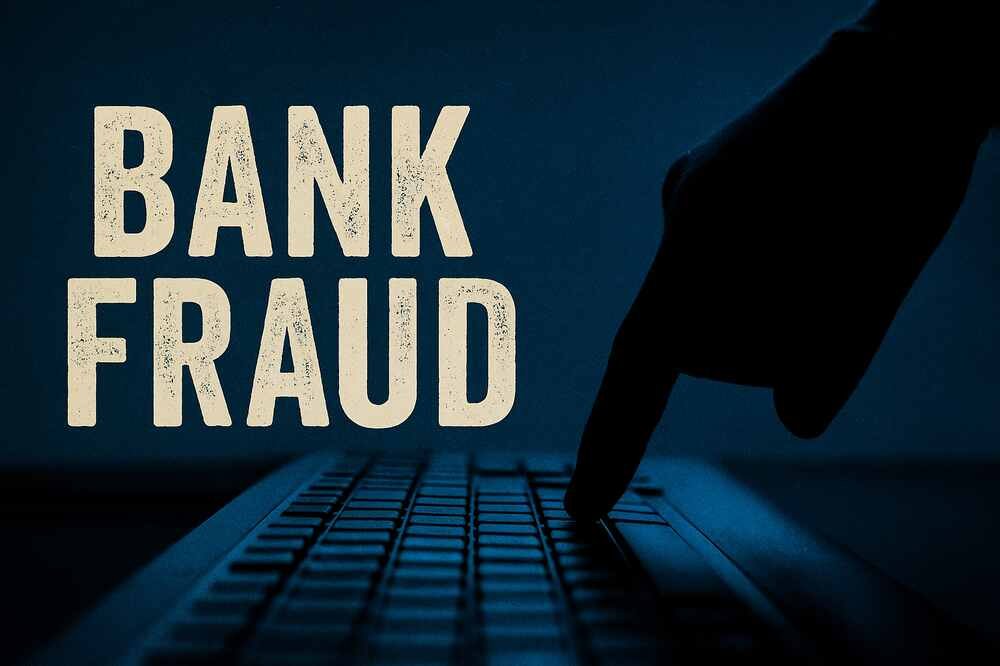Stay Vigilant Against Bank Fraud
To legitimize their action and to fool you, fraudsters can try to gain your trust by pretending to be part of your bank’s teams or work for your bank. Today, with the democratization of different payment methods, everyone is exposed to bank fraud. And it must be said, the big legacy banks as well as the new online banks can suffer from bank fraud.
In fact, it is the customers who are exposed to fraud, but not the banks themselves (or very little). Even if these banks are doing everything they can in terms of security to avoid these banking frauds to their customers, it is clear that they are making progress. We have therefore reviewed the main bank frauds to avoid them and studied how banks support customers.
Your bank never asks for your personal codes, whatever or whoever they are.
Some simple tips to protect yourself against bank fraud:
1. NEVER click on a link:
None of our emails or SMS sends you to a web page that asks you for your username and personal access codes or any other banking information (bank card or account numbers) to connect to the mobile sites and applications.
2. NEVER give your codes to anyone:
Under no circumstances will we ask you by phone, email or SMS for your personal access codes to sites and mobile applications, secret bank card codes, validation codes received by SMS or by notification.
3. NEVER perform a test at the request of a technician:
Under no circumstances will we ask you to validate or cancel transactions or transfer remittances, or to add third-party accounts for testing.
HOW TO PROTECT YOURSELF FROM FRAUDORS?
Behind the seeming ease of the Internet lie many people with bad intentions. Mistrust is the order of the day! The Internet can be compared to a huge market place and exchanges, it is prudent to protect yourself as much as you protect yourself when you leave your home.
Would it occur to you to leave your bank card unattended in a store or not to lock your house? On the Net, it’s the same thing. It is important to keep your data in a secure space, not to divulge personal information to third parties, and not to accept gifts from anyone. Beware of overly tempting offers.
When it’s too good to be true, then it isn’t.
Regularly check your bank statements and stop your card as soon as an outflow of money seems suspicious to you. In short, do not wander the Internet without protection and without giving a minimum of thought to your actions.
MOST COMMON TYPES OF BANK FRAUD
In this article, on the frauds most commonly encountered on the Net and elsewhere. And we give you tips to protect yourself from the bank fraud.
1. PHISHING OR RANSOMEWARE
Phishing is for the fraudster to retrieve your payment or connection information by pretending to be a recognized organization that you trust. This can be your bank, your energy supplier, your telephone operator or your family allowance fund. In general, the request for information is made by email. The mailings look like real emails asking you to confirm your personal information to be reimbursed for something or to continue to receive an allowance. These frauds can also pass through simple SMS. The purpose of these scams is to steal your banking information, save your user IDs and passwords, and even steal your identity. The crooks can then take over your accounts and use them in all your secure personal spaces.
HOW TO PREVENT YOURSELF?
• Keep in mind that an official body will never ask you for personal or banking information by email or SMS.
• Always ignore emails and texts from people you don’t know. Beware of unusual addresses or numbers. Never click on any link or open any attachment from a recipient that you find unusual or fraudulent.
• Delete the questionable SMS or e-mail immediately.
• Enter the url of your account management site yourself or check the correct spelling of it before clicking on a link – check in particular the https (and not “http”) at the beginning of the URL in front of the cash register -savings.fr
• Remember to download the application from your bank to consult your accounts securely.
2. TECHNICIAN FRAUD / FALSE TEST
The fraudsters present themselves as belonging to the technical services of the bank. They contact you to perform tests, strengthen the level of security, or offer updates to your subscriber area. They offer you to take control of your computer, and / or encourage you to make a transfer to test updates. You believe you are in a test environment and follow the instructions given to you. Unfortunately, you have just given access to information and personal connected space.
HOW TO PREVENT YOURSELF:
Be alert as soon as a spontaneous call from the Bank suggests that you perform tests from your customer area: your bank will never contact you for this reason. If tests can be carried out, they are always on your initiative.
Ensure the identity of the professional and the destination of the funds before making a money transfer, be aware that banks NEVER do a test transfer.
Be alert as soon as a request combines the 4 typical characteristics of an attempted fraud: urgency of the request, insistence of the interlocutor, high amount and transfer to an unusual country
And above all, trust yourself: If you have any doubts, it is most likely well founded, call your advisor or your usual contact at the same time and explain the situation to them.
3. USING YOUR FEELING FRAUD
Scammers use fake identities and fake photos to seduce their victims online. They earn the trust of people they chat with through dating sites, court them, and then manipulate them into money. Scammers make up stories of loved ones in need of emergency medical care, for example. They demand money by playing on the sensitive chord of those trapped. Once the money is sent, false lovers and their beautiful promises disappear into the wild.
HOW TO PREVENT YOURSELF?
• Stay on your toes and beware of online dating that seems too idyllic.
• Never send money or give out banking or overly personal information on a dating site.
• Also, never agree to cash a check in exchange for money transfer or prepaid cards. It will surely be a wooden check or a stolen check.
4. SOCIAL MEDIA SCAMS
Promise of easy money, work at home very well paid or even request for service for a commission, victims are approached on social networks by unscrupulous fraudsters who use fake accounts and false profiles.
The most frequent fraud is that of the “commissioned transfer”. In exchange for an attractive commission, the victim must receive funds and then make a transfer, usually to a foreign bank or an online bank. In some cases the victim gives his credit card and the code to his “friend” for withdrawals at the ATM / credit card. Sniffing out the easily earned money, the person is not suspicious and gives all their bank details to the scammer who contacted them. Credit to the account is made by check (remittance made by the fraudster using the IBAN communicated by the customer). Unfortunately, once the money transfer has been made, the victim realizes that the check has returned unpaid and that the fraudster has fled with the sum. He is of course no longer reachable and has closed all his profiles on social networks.
HOW TO PREVENT YOURSELF?
• Only accept people on social media who you really know or who are part of your personal and professional network.
• Beware of promises of easy money. There is no such thing as easy money earned …
• Never give your bank details to strangers.
5. FALSE JOB OFFERS
Job boards sometimes hide scammers who seek to take advantage of the frailty of people looking for a new job. Job seekers are therefore advised to beware of unusually tempting or overly engaging offers:
- unusually high salary;
- reduced hours or light work at home;
- offer sent at unusual times for a company;
- offer riddled with spelling or grammar mistakes;
- shipper from another country or continent;
- offer that asks you to send money for an interview or an application package.
The sole purpose of these bogus offers is to obtain personal information or to defraud you money.
HOW TO PREVENT YOURSELF?
• Double check all the information and contact details on the advertisement. Check the company’s web presence and reputation. If you can’t find anything about this company or if you come across an unreliable site, don’t follow through.
• Keep in mind that a normal business will never ask you for money for anything, nor will it give you money until you sign an employment contract.
• Beware of overly good deals. Check the syntax and style of the ad. Real ads are written by human resources professionals and contain no mistakes or unusual turns of phrase.
6. LOAN FRAUD
For some time now, credit redemption fraud has intensified. In this fraud scenario, crooks pose as a credit agency. They contact credit holders with the promise of a repurchase at an unbeatable rate. Pretexting the steps to open a file, the fraudsters extract from the victims all the information necessary to open a credit online. A new credit is then opened with the spoofed identity. The borrowed amount is paid to the credit institution on the victim’s account who is then contacted again to transfer the amount to an external account. Believing to finalize the operation of repurchase of credit, the victim is not suspicious and his money disappears in nature.
HOW TO PREVENT YOURSELF?
• Talk to your banking advisor before doing anything like this.
• Check all the information regarding the credit company in question.
• Be wary at the outset if a credit professional asks you to remain discreet about the redemption. It is never a good sign.
There are many scams and frauds. Fraudsters have a fertile imagination and are increasingly organized. Beware of too good-looking stories, easy money making, or cut-price subscriptions. Scammers approach you today in the places where you spend the most time: social networks, online gambling sites or dating sites. And even job search sites through fake ads! Any approach that is a little too insistent must appear suspicious. Never give out personal information and be careful not to overdo it.
Don’t over exposing your life on the net. Trust your instincts above all and never lower your vigilance.
If you are the victim of fraud that relates to your money directly, file a complaint and speak to your bank advisor as soon as possible.
Read also: Economic Systems | List, Type and Explanation
Do you think you have been the victim of fraud?
Contact your usual contact immediately. They will tell you what actions to take.
Want to report fraudulent content?
Your report will protect the Bank’s customers from this attempted fraud. You will thus contribute to the fight against cybercrime. Thank you! Report a fraudulent email directly to your bank.
7. FALSE INVESTMENT FRAUD
The Autorité des marchés financiers (AMF) and professionals in the investment sector are launching a new call, to which we join, for the greatest vigilance in the face of the sharp increase in the use of the usurpation of actor names or financial products to get savers to subscribe to false investments.
The procedure is usually as follows: you fill out an online form that offers lucrative investments and allows crooks to collect your personal data. You are then called by a fake advisor or manager who is very assertive and persuasive, urging you to decide quickly to take out the investment presented as an opportunity to be seized very quickly.
In reality, the investment does not exist and you lose all of the funds you have transferred!
The crooks usurp various information in order to make more credible their fraudulent offers of fake investments. They reproduce on their websites and their false contracts the name, logo, approval or authorization number of real organizations (banks, asset management companies, financial investment advisers or wealth management) and create false internet or email addresses close to real addresses.
No one is safe from this type of scam, including experienced investors.
Before any investment, have the right reflexes:
- Beware of promises of quick wins or high returns without risk
- Only invest in clear investments that you understand
- Do not communicate your personal data (telephone, email, identity documents, RIB, proof of address or income, etc.) to sites for which you are not sure of the reliability or by filling out forms on the Internet after having clicked on an advertising banner
- Don’t follow up on unsolicited phone calls
- Do not give in to the urgency or the pressures of your interlocutor (offer open to a limited number of people or expiring soon …) and take the time to reflect
- Perform careful checks to ensure the identity of the individual offering you an investment
Do not rely on the Regafi or Orias numbers mentioned in the documents of your interlocutor; these may also have been spoofed - Contact the company whose contact person claims to be, after having researched their contact details yourself in official registers or in open sources, in order to verify that the contract actually emanates from them
Compare to the letter, the email address of your interlocutor with that of the company of which your interlocutor claims - Check the if it is mentioned in the blacklists available on website.
- Do not hesitate to inquire with your bank institutional services.
Banking fraud: contactless mobile payment hacking
Let’s be clear, to date the risks of hacking data exchanged between the smartphone and its payment terminal or the simple activation of the mobile payment application without the customer’s knowledge are identical to those existing for contactless payment cards. Let’s take a quick look at the major players in contactless mobile payment.
bank payment fraud There has been little hindsight to date on the anti-bank fraud solutions offered by these brand new mobile payment methods. Apple Pay has just arrived in France (Apple Pay is partnering with Carrefour Banque and the BPCE group), its system is reminiscent of contactless payment, except that it goes further. Thanks to their iPhone or their Apple Watch, customers will now be able to pay, thanks to a simple fingerprint which should normally provide an additional level of security to counter bank fraud.
To date, even less feedback on the mobile payment offered by Paypal and the solutions provided by the American giant to counter bank fraud via this contactless technology.
Sources: PinterPandai, Westfall Sellers Attorneys, SQN Banking Systems, Investopedia
Ohoto credit: Don Hankins / Flickr



